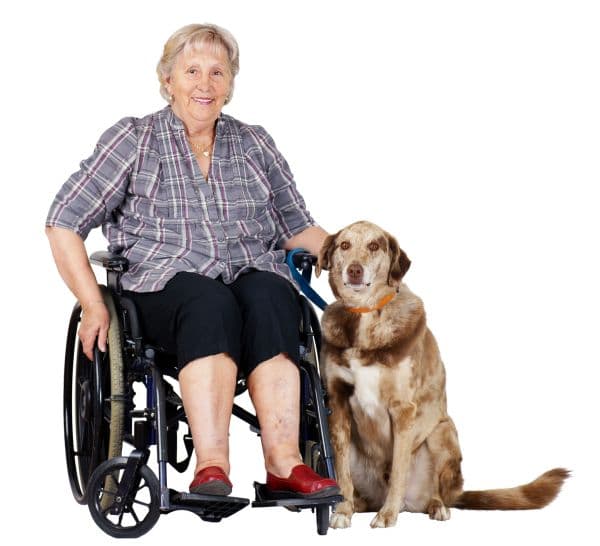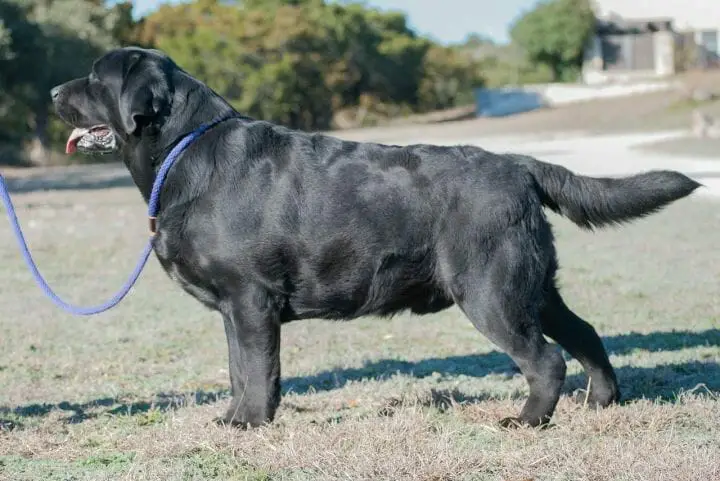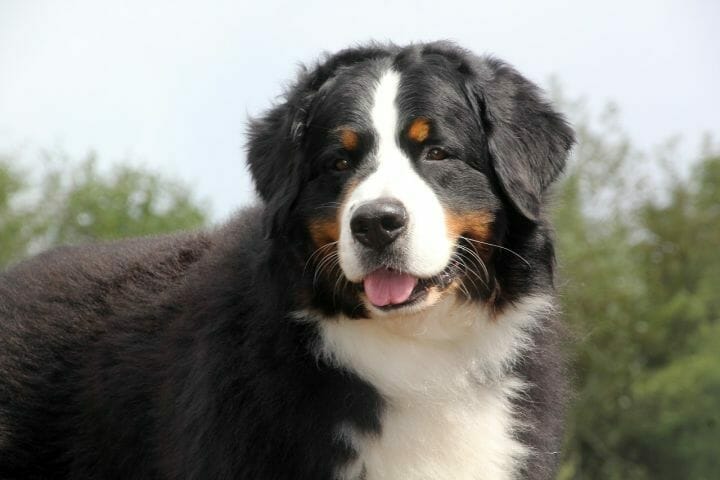Most people think that dog is a man’s best friend. But for those suffering from a physical disability, their canine companion can be much more than just their best friend.
Indeed, many people using service dogs cannot imagine working through their daily routine without that companion, always faithfully by their side and protecting them, as well as making life more accessible.
If you are looking for a quick answer, in our opinion, the best breeds of dogs for people in a wheelchair are:
In this article, we cover what makes these dogs suitable for people in a wheelchair. We also discuss the therapeutic advantages of having a dog.
Contents
The importance of service dogs cannot be understated. In fact, the Americans with Disabilities Act (ADA) only recognizes dogs as service animals1. Watch the video below to understand the ADA definition of service dogs.
ADA also differentiates between a service dog and a pet dog. The main difference between the two is that service dogs get thorough training to perform all or some of the above-mentioned duties.

Therapeutic Advantages of a Dog
The therapeutic advantages of having a service dog (or a pet dog who need not necessarily qualify as a “service dog”) are immense. Whether your disability is permanent or temporary, you are seldom in the best frame of mind in its aftermath.
Statistics show that depressive conditions are more common among those with disabilities2, especially if you are not surrounded by friends or family – or you do not have a canine companion.
A dog makes you much happier, prevents you from feeling lonely, reduces your depression, and in general, increases your happiness by improving the outlook on your life. That effect of your dog cuddling up to you, cannot be matched. Not only does it calm you down, it also uplifts your mood.
A dog can the younger family members, empathy, and a feeling of belonging. Therefore, while we list out below, a few good-to-have characteristics of a service dog, you may remember that this family member has a lot more to offer beyond service and help with your day to day activities.

Here we have a video that showcase how a service dog could be of help.
What to Consider When Getting a Service Dog?
One of the first things to consider while getting a service dog, is the size of the fully-grown breed. Ideally, you would want your dog to help you move your wheelchair from time to time (if not all the time). So, it needs to be big enough to have the strength to be able to do so.
Check out how big will your puppy get as it grows.
Having said that, it will be difficult for the dog to pull you over wheelchair ramps. While on a ramp, your dog should ideally be walking beside you. If it’s too big, there may not be enough space for the dog to walk beside your wheelchair on standard-sized ramps.
You may also like Best Wheelchairs For Dogs
Dog Care and Life Span
You should keep in mind the bandwidth it would take to maintain your service dog. While some breeds like terriers and poodles are high maintenance breeds, some like the Labrador Retriever and German Shepherd are low maintenance. Also, give a thought to the life span of your dog. Try to pick a breed that lives for about 12 – 15 years, but no less than 10.
Behavior Towards Strangers
A companion dog has to interact with a lot of strangers on a typical day. The ideal dog should be calm in the middle of strangers and even when unknown people show affection or give it a pat. That’s why friendly but energetic breeds like the Beagle do not make good disability companion dogs. They may be too energetic for someone with a disability and can be easily distracted by strangers.
Training for Your Dog
Professionally training a dog to be able to do all activities of a service dog is an expensive affair. It can set you back by a few thousand dollars. On the other hand, you can choose to self train your dog to accomplish as much as possible.
The three things most important to train your dog are its temperament, its willingness to learn (often linked to young age) and its faithfulness and compassion towards you. If your dog is an exceptionally compassionate breed, it may pick up activities that you have to strain for, much faster than other breeds.

Training should start at the basics when the dog is sufficiently toilet trained and can follow basic commands like ‘stay’, ‘fetch’ and ‘follow’. The next level of training is maintaining a calm demeanor and good behavior on and off the leash
There will be a lot of situations where your dog has to be without a leash and it has to be leading the way for you. This will take time and can be achieved through proper reward methods of training. Once you achieve this level, then you should progress towards specific helping tasks like pulling a wheelchair, picking up items that you instruct it to, and so on and so forth, depending on how much you would need your dog to help you with.
You may also like Best Dog for Special Needs Child
Best Breeds of Dogs for People in A Wheelchair
German Shepherd
When it comes to a breed of dog that you would want to train, few can be better than the German Shepherd. The German Shepherd is unparalleled in terms of a combination of intelligence, strength and compassion.
At its healthy best, the dog will be muscular and lean with a moderately thick coat of fur. It is highly trainable and a big advantage is its tolerance for a larger range of temperatures.
So, mostly, your outdoor trips will not get restricted by the weather which your canine partner will not be able to bear.

A natural helper, the German Shepherd has a strong temperament that will not allow it to be agitated in crowded places, at the same time it will not let its guard down in being your protector. It is an active breed, and you should take care to provide it with ample physical and mental challenges to keep it at its healthiest.
Caution: With their generous fur coat, German shepherd shed a lot throughout the year. If you have allergies, it may not be the best choice for you.
Rottweiler
Well, if a Rottweiler is your companion, you may rest assured that few people will want to mess with you. However, you would be surprised to know that underneath the ferocious jowls and a muscular physique, a Rottweiler is actually a very friendly and compassionate dog.
It is not only compassionate enough to be proactive in helping you with your tasks, but you will find it really easy to train it,, due to its high intelligence and the intent to learn and be useful.

Caution: A thing to note about Rottweilers is that their loyalty is unflinching. And, therefore, from an early age, a Rottweiler needs to be accustomed to the social circles of its master, so that it becomes aware of human interaction.
This will let it learn more accurately about when to be suspicious and when not to be and when to be acting for your protection.
Labrador Retriever
The Labrador retriever is a social dog. It is a friendly breed. And it specializes in picking things up and carrying them back to you. Fetching is in their blood and you would not take even a day to properly train a Labrador Retriever about what to fetch and how to fetch it.
A good temperament along with good strength makes it a really good candidate to be a helper companion, which can walk miles alongside your wheelchair without flinching.

Caution: Due to the immense popularity of labs, impure breeding has injected a few health problems in the breed. You should try to get a pure bred dog to avoid health issues in the future.
You may also like Best Dog for Elderly Widow
Golden Retriever
The golden retriever is an all-rounder dog: it scores high on compassion, intelligence, its ability to train, athleticism and loyalty. They are pretty sociable as well and if well trained from an early age, can be extremely well behaved in public spaces and even without a leash.
It is a good-natured dog capable of complementing your emotions very well. It has been found to be an extremely good candidate to understand your moods and reflect appropriate behavior.

Caution: These dogs are an athletic breed and lack of proper exercise or activities may lead to obesity and other health issues. So, if you are not planning to expose your dog to a lot of activity, this may not be the right fit for you.
Bernese Mountain Dog
The Bernese Mountain Dog is an excellent choice as a mobility assistant dog, not only because of their strength but also because they are intelligent enough to respond to emergency situations by calling for help, getting the right medicine and such things as it is trained to do.
Though big on size, it has good temperament and is rarely agitated even in the company of strangers.

Caution: The Bernese Mountain Dog, as the name suggests is a cold climate dog with double layer of coat. Therefore, it may not be a suitable candidate for a warm climate. If you are planning to own one in moderately warm weather, make sure to watch out for excessive panting, fatigue or dehydration. Do remember to keep water handy all the time for your dog to drink.
Greyhound
A greyhound is an extremely athletic candidate for your disability needs (it is, in fact, the fastest among all canine species). If you own a power wheelchair and decide to go for a countryside ride, your wheelchair may run out of batteries, but your greyhound will not bat an eyelid and will be ready for more.
It is never one to shirk work and some activity and also scores high on being affectionate and loyal.

Caution: It really is a black hole for activity, the more activity you will throw at it the happier it will be. So, if you are not planning to move around much, your greyhound may not be the happiest dog around.
You may also like Best Guard Dog for Elderly
Conclusion
When it comes to the choice of a dog, it is heavily dependent on our own personalities, and therefore, you should ideally choose a breed that complements your personality. That will eventually be helpful for you to build an even stronger bond with your canine companion.
If you are a wheelchair user, you may want to read about wheelchair accessories like wheelchair umbrellas, wheelchair headrests and tire pumps for wheelchairs, that can make your life easier.
References
